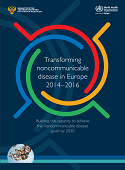Transforming noncommunicable disease in Europe 2014–2016: Building the capacity to achieve the noncommunicable disease goals by 2030 (2018)

Download
Cardiovascular diseases, cancer, chronic respiratory diseases and diabetes are chronic diseases that threaten health, livelihoods and lives. But most of these noncommunicable diseases (NCDs) can be prevented and controlled. A new WHO office based in Moscow and funded by a voluntary contribution from the Ministry of Health of the Russian Federation, is transforming the ability of European countries to combat NCDs.
Strong leadership and urgent action are required at the global, regional and national levels, and the WHO European Office for the Prevention and Control of Noncommunicable Diseases (NCD Office) was launched in Moscow in 2014. The launch conference was attended by over 100 delegates from 26 countries, observers and key figures from the Russian Federation, technical experts, WHO collaborating centres and international organizations.
Dedicated to reducing the disease burden of NCDs in all 53 countries of the WHO European Region, the NCD Office aims to build capacity within countries to combat avoidable NCDs. Since 2014 the Office has been leading the Region in strengthening national capacity for preventing and controlling NCDs, promoting an intersectoral approach and developing policy, and working in close partnership with the Ministry of Health of the Russian Federation, institutions in the Russian Federation, WHO collaborating centres and international partners.



